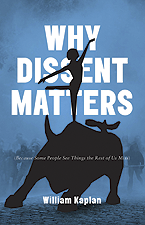
William Kaplan.
McGill-Queen’s University Press, 2017, 376 pp;
ISBN: 978-0-77355-070-4.
by Charles Reeve
Robert Latimer was guilty. But that’s only partly why a jury convicted him of murdering his 12-year-old daughter Tracy, in 1993. The jury sympathized with Latimer’s sense that death would end his daughter’s suffering. Living with acute cerebral palsy, Tracy was quadriplegic, deeply developmentally disabled and in constant pain, and suffered five or six seizures a day.
Still, the jury pronounced Latimer guilty because its members lacked what William Kaplan, in his intriguing, articulate new book, says is dissent’s motor: “A lot has to do with character. Either you have it or you don’t. There are really remarkable people out there; people who risk their reputations, their financial security, and sometimes their lives in pursuit of principle and really big ideas — challenging and dangerous ideas. We need to know more about them, to try to figure out what makes them stand up while everyone else remains seated, and then to listen carefully to what they have to say.”
By waiting for permission to dissent (which they could have done, Kaplan notes, through “jury nullification”), Latimer’s jury erred crucially. Things might have been different if its members had possessed the fortitude of Frances Kelsey, who, by contrast, Kaplan describes as his favourite dissenter.
Starting from small-town Vancouver Island, Kelsey was an unlikely David to Big Pharma’s Goliath. But after finding her way to McGill, the University of Chicago and the FDA, she stymied Chemie Grünenthal’s effort to bring a sleeping medication — already available in 50 countries — to the United States, by rejecting Grünenthal’s science as rubbish. The new drug was thalidomide and Kelsey’s fortitude prevented its devastating legacy from ruining thousands more lives than it did.
These examples and a dozen or so others in this book show that Kaplan has in mind dissent of the juridical, not political, sort. He sympathizes somewhat with Occupy Wall Street and even more with Boycott, Divest and Sanction, but his foci are due process and proper science. That’s how the cases of Latimer, Kelsey and Steven Truscott (the latter nearly hanged for murder — at 14 years old — after a trial that should have acquitted him) end up together. For Kaplan, dissent means refusing complacency, bureaucratic convenience and the abdication of responsibility. It means — his subtitle’s expanded significance — fostering organizational and social cultures to support people who see evidence that most of us miss, often despite it being right before us.
Here, Kaplan’s interests converge closely with those of academia, as in the chapter “How Not to Make Public Policy,” about Stephen Harper’s time as Prime Minister. Seeing that empirical evidence refuted many of their major initiatives, Kaplan argues, Harper’s ministers took the offensive, muzzling federal scientists, dismissing Department of Justice researchers and abolishing the long-form census.
Granted, Kaplan reserves a place in Hell for federal Conservatives (see his book A Secret Trial: Brian Mulroney, Stevie Cameron and the Public Trust, published in 2004). But, regardless, he makes crystal-clear that only unimpeded research has value. This perspective has made him one of Canada’s premier arbitrators on academic matters (indeed, my faculty union has used him many times) but his point, going beyond academia, is that anyone with something uncomfortable to say needs to speak up and needs to be heard.
This book does have some weaknesses. A few chapters — like chapter one, about the Israeli Defence Force’s “Tenth Man” program — are not fully resolved. But the broader argument, especially in the discussions of science and of the justice system, outweighs the lapses. Dissent — being inconvenient when inconvenience makes a difference — drives progress. I predict that the dissenting voices of disability advocates like the Council of Canadians with Disabilities in this country and Not Dead Yet in the US will be the next to be heard. If so, it might turn out that — despite itself and much current sentiment — Latimer’s jury was right after all.
__________________________
Charles Reeve is an associate professor in the faculties of art and liberal arts and sciences at OCAD University, where he also is president of the OCAD Faculty Association.